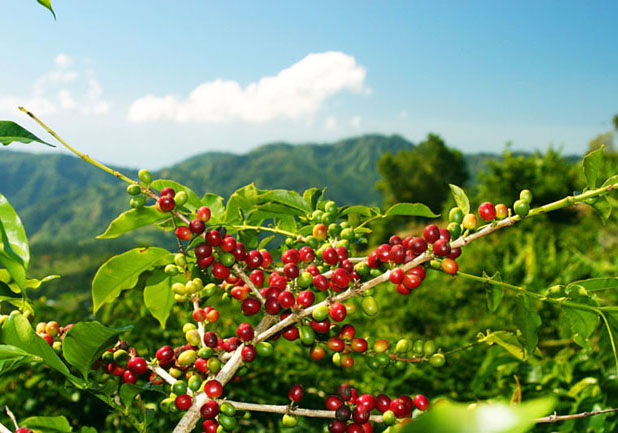How much coffee beans are made from Ethiopian coffee beans by the sun Yega Xuefeiduoduo adado
Choose fresh coffee beans. When buying, pay attention to whether the color of the beans and the size of the particles are the same. Good coffee beans are shiny and have a strong aroma without being mixed with peculiar smell. No matter what kind of coffee beans, freshness is an important factor affecting the quality. When shopping, grab one or two coffee beans in your mouth and chew them with a crisp sound (indicating that the coffee is not damp) and the fragrance of the teeth and cheeks is the top grade, but it is best to squeeze it with your hands to feel whether it is solid, rather than buying crispy coffee. If the coffee bean has lost its fragrance or smells stale, it means that the coffee bean is no longer fresh and is not suitable for purchase.
Freshly fried coffee beans are not suitable for immediate consumption and should be stored for a week to completely release the gas from the beans.
Generally speaking, the best drinking period for coffee is a week after stir-frying, when the coffee beans are the freshest and the Aroma taste is the best.
In addition, the purity of coffee beans is also another consideration. The expert candidate for coffee is not necessarily to look at the size of the particles, but to grab a handful of individual coffee beans (RegionalCoffee), about dozens of portions, to see whether the color of each single bean is the same, and whether the particles are similar in size and shape, so as to avoid buying shoddy products disguised as mixed beans. But if it is a synthetic bean (BlendedCoffee), it is a normal phenomenon that the size and color are different. In addition, heavy heat and medium-deep roasting will cause coffee beans to produce oil, but if the lightly roasted beans produce oil, they have gone bad, not only reducing aroma, but also astringent and sour taste. In short, when buying coffee, we should pay attention to its freshness, aroma and whether it is stale or not, and the ideal purchase quantity is to be able to drink it in half a month. The two coffee bean production methods should first remove the skin, pulp, racing peel and silver skin after harvesting the fruit and before shipping it on the market. There are two kinds of methods: drying (also known as natural or non-washing) and washing.
Country: Ethiopia
Grade: G1
Production area: Guido Gedeo
Altitude: 1900-2100 m
Treatment: insolation
Variety: native species Heirloom
Producer: Adado Cooperative
Flavor: blueberry, honey, purple fruit, citrus notes
Adado (Adoto) is an amazing trace producing area of Yega Xuefei. When you open the bag, the air is filled with a lot of blueberry and vanilla aroma, after baking and grinding release, the aroma will explode again, this is a veritable blueberry bomb. The first rich blueberry flavor is accompanied by a hint of well-balanced acidity, a typical sunny coffee. The cup is sweet, full of soft and delicate scent of flowers. Quite simply, this is an exciting cup of coffee with rich fruity aromas, thick bady, sweet and delicate floral flavor.
Adado Cooperative Coffee comes from the Guido producing area (GedeoZone) on the southeastern plateau of Ethiopia, with the capital AddisAbaba in the north. The Gedeo (often referred to as the Darasa) are classified as a culturally and linguistically unique ethnic group. It is bordered by Sidama to the east, Alaba to the north and Burji,Guji to the west. All the ethnic groups here belong to the Kucht language family of East Africa (Cushitic). Since ancient times, the cliffs in the upper reaches of the great rift graben in the north of Sidamo have been the main active area. To date, Gedeo is still one of the most densely populated areas in Ethiopia.

Important Notice :
前街咖啡 FrontStreet Coffee has moved to new addredd:
FrontStreet Coffee Address: 315,Donghua East Road,GuangZhou
Tel:020 38364473
- Prev

Yega Xuefei Solar treatment Banki Maggie Ethiopia
Choose fresh coffee beans. When buying, pay attention to whether the color of the beans and the size of the particles are the same. Good coffee beans are shiny and have a strong aroma without being mixed with peculiar smell. No matter what kind of coffee beans, freshness is an important factor affecting the quality. When shopping, grab one or two coffee beans and chew them in your mouth with crisp sound (indicating that the coffee is not damp) and teeth and cheeks.
- Next

Indonesia Sumatra Lindong Indonesia Mantenin Coffee Beans There are several ways to make coffee beans
Choose fresh coffee beans. Pay attention to whether the color and particle size of the beans are consistent when purchasing. Good coffee beans have a bright and shiny appearance, and have a strong aroma without mixing odors. No matter what kind of coffee beans, freshness is an important factor affecting quality. When purchasing, grab one or two coffee beans and chew them in your mouth. It should be crisp and sound (indicating that the coffee is not wet).
Related
- Guji coffee producing area of Guji, Ethiopia: Humbela, Shakiso, Wulaga
- What is the most expensive variety of Qiloso in BOP multi-variety group?
- How to store the coffee beans bought home?
- Why are Yemeni coffee beans so rare now?
- Ethiopian Sidamo all Red Fruit Sun Sun Santa Vini Coffee beans
- SOE is mostly sour? What does it mean? Is it a single bean? what's the difference between it and Italian blending?
- Is Italian coffee beans suitable for making hand-brewed coffee?
- How to choose coffee beans when making cold coffee? What kind of coffee beans are suitable for making cold coffee?
- Just entered the pit to make coffee, what kind of coffee beans should be chosen?
- Can only Japan buy real Blue Mountain Coffee? What are authentic Jamaican Blue Mountain coffee beans?

